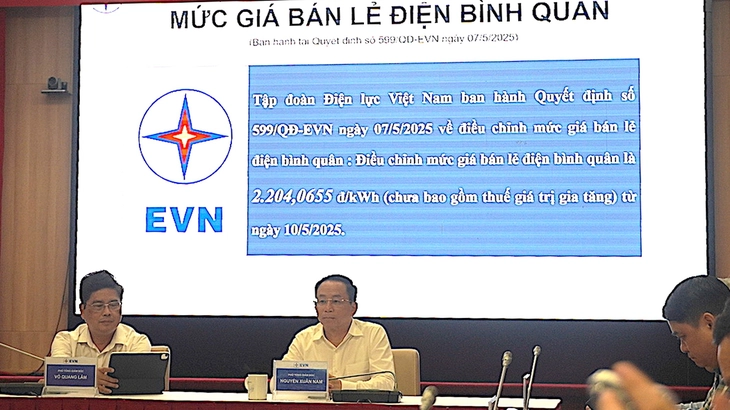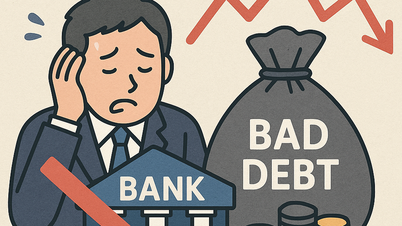
EVN press conference to announce electricity price adjustment - Photo: NGOC AN
From May 10, the average retail price of electricity increased by 4.8%. Vietnam Electricity Group (EVN) said the adjustment was due to the continuous increase in input costs, especially the structure of high-priced electricity sources is increasing, while the cheap electricity source such as hydropower is gradually decreasing.
Mr. Vo Quang Lam - Deputy General Director of EVN - said that the price increase was implemented in accordance with the Electricity Law, Decree 72 and related regulations. However, in the context of EVN's unclear financial situation, the price increase continues to put pressure on people and businesses.
What is the impact of electricity price increase?
According to EVN's calculations, the new average retail electricity price adjustment will impact the CPI by 0.09%. Specifically, for households using less than 50kWh of electricity, the electricity bill will increase by about 4,550 VND/household/month. From 51 - 100kWh, the electricity bill will increase by 9,250 VND/household/month. From 101 - 200kWh, the increase is 20,150 VND/household/month.
Customers using 201 - 300kWh must pay an additional 33,950 VND/household/month; using electricity from 301 - 400kWh, the additional cost is 49,250 VND/household/month; from 400kWh or more, the increase in electricity bill is about 65,050 VND/household/month.
Poor households and social policy households will be supported with monthly electricity bills equivalent to the amount of electricity used by 30kWh/household/month. For social policy households with electricity usage of no more than 50kWh/month, the support level is also equivalent to the amount of electricity used by 30kWh/household/month. The support level for poor households and social policy households is 56,790 VND/household/month.
Therefore, if the new price is applied, each poor household will receive electricity support of about 59,520 VND/household/month (excluding value added tax). This policy aims to reduce the burden of electricity costs for poor households and social policy households, helping to ensure social security and implementing the Government 's policy on supporting disadvantaged groups.
Reasons for electricity price increase to more than 2,200 VND/kWh
At the information exchange session, Tuoi Tre asked whether EVN has adjusted electricity prices up by more than 17% since 2023, enough to offset the losses of the electricity industry, as well as requested to provide more financial information about EVN, whether the financial losses, especially the exchange rate loss of this group, will be overcome after the price increase. How will EVN advise on the two-component electricity price mechanism as well as the early implementation of a competitive retail electricity market to ensure electricity prices are close to the market and transparent.
Mr. Vo Quang Lam said that the electricity produced and purchased by EVN in 2024 and 2025 will have a growth rate equivalent to about 33.6 billion kWh, mainly from electricity sources produced from high-cost power plants. Meanwhile, the proportion of hydropower is continuously decreasing and reaching the limit, gas energy and coal-fired thermal power, and oil-fired electricity have higher costs than low-cost sources.
"This year, weather fluctuations have reduced hydropower by nearly 7 billion kWh compared to 2024. Coal-fired thermal power has grown a lot in the imported coal segment. World coal prices in 2021-2023 have increased due to geopolitical fluctuations. In the first four months of 2025, costs for imported coal, gas and oil will continue to increase," said Mr. Lam.
Therefore, based on the operation plan, EVN has regularly reviewed, calculated and reported to competent authorities to adjust electricity prices. The adjustment carefully considers input costs, fluctuating costs, and the affordability of people and businesses to find a balance between the requirements. Mr. Lam said that with the responsibility of ensuring electricity supply, EVN must also be responsible for ensuring a competitive economy and social security, so the 4.8% increase is considered "relatively appropriate".
Electricity prices continue to increase, EVN still doesn't know when the loss will end
However, information related to EVN's financial situation, exchange rate losses and financial expenses of this group has not been fully disclosed. Regarding the electricity price mechanism, especially the consultation on the construction of a two-component price mechanism, Mr. Lam said that EVN has developed a project on a two-component price mechanism, coordinating with leading consultants to synthesize input factors, weather factors, economic growth and electricity usage behaviors of customers.
"In addition to large electricity customers, EVN is currently continuing to add more household electricity customers to complete the project to submit to the Ministry of Industry and Trade and the Government. Thus, we will add packages for customers in need and within the scope of adjusting the two-component electricity price, expected to be completed in the second quarter (May, June) and submitted to the Ministry of Industry and Trade, ensuring the best electricity supply," said Mr. Lam.
Mr. BUI THANH THUY (Vice President and General Secretary of Vietnam Consumer Protection Association):
Need a suitable roadmap when increasing electricity prices
Adjusting electricity prices is necessary in the context of limited supply and high input costs, especially renewable energy sources, imported coal power sources or imported electricity sources with high prices. However, this adjustment must have a reasonable roadmap to avoid creating additional burdens for people and businesses.
According to regulations, electricity prices are reviewed and adjusted periodically, ensuring transparency with the participation of independent auditing agencies. However, it is necessary to link price increases with policies to promote electricity saving, because increasing electricity prices will be a burden, while electricity growth must be twice as fast as economic growth, so if electricity consumption is high, it will also be a burden for both the electricity industry and the people.
The amendment of the Law on Economical and Efficient Use of Energy is expected to create additional mechanisms to encourage people to use electricity more economically and safely.
Enterprises strive to save electricity, EVN strives to stabilize prices
In the context of difficult orders, high input costs and increasingly fierce competition in the international market, businesses believe that the continued increase in electricity prices will add to the difficulties.
Speaking to Tuoi Tre, Mr. Pham Van Viet, General Director of Viet Thang Jean Company, Vice President of the Ho Chi Minh City Textile and Garment - Embroidery Association, said that increasing electricity prices during this period will create double difficulties for the textile and garment industry, when many businesses are coping with the US's reciprocal tax. According to Mr. Viet, although many businesses have invested and made the most of solar energy, for specific stages such as weaving and dyeing using high-tech machinery, increased electricity costs will directly affect product prices.

In the context of increasing electricity prices, businesses need to cut costs so that profits do not decrease - Photo: TP
“If we include this electricity price increase, in the past three years, electricity prices have increased by a total of 17%. Normally, electricity costs account for 4-6% of the production costs of the textile industry, so the increase in electricity prices contributes to increasing the cost of goods, while Vietnamese goods are already weaker than other countries in terms of technology and human resources,” Mr. Viet noted.
General Director of Viet Thang Company Jean also estimated that the cost of investing in green and sustainable products has increased sharply in recent times, so the increase in electricity prices has increased both input costs and product prices, further reducing the competitiveness of enterprises. Currently, enterprises are making efforts to produce and race to complete orders to deliver before the corresponding tax takes effect, so the increase in electricity prices will immediately affect enterprises.
Meanwhile, Mr. Do Phuoc Tong, Chairman of the Board of Directors of Duy Khanh Mechanical Company, Chairman of the Ho Chi Minh City Mechanical and Electrical Enterprises Association, admitted that the increase in electricity prices will cause Vietnamese manufacturing enterprises to face additional cost burdens. With the impact of the reciprocal tax, enterprises are experiencing a decrease in orders, so the increase in electricity prices will make the input cost problem more difficult. Mr. Tong said that electricity costs account for 10% of his enterprise's production costs, and the current increase in electricity prices will directly affect the selling price of products, affecting the competitiveness of goods in the market.
The general director of a manufacturing company in Ho Chi Minh City said that in the context of strong price competition, even a 1% increase in costs is a “headache” for businesses. Therefore, this company believes that in addition to the efforts of businesses to save electricity, improve machinery and use renewable energy, the electricity industry needs to ensure stable electricity prices, avoiding frequent price increases that make businesses passive in terms of costs.
Source: https://tuoitre.vn/tang-gia-dien-4-8-evn-noi-da-can-nhac-ky-kha-nang-chi-tra-cua-nguoi-dan-20250509235049203.htm



![[Photo] Prime Minister Pham Minh Chinh and Prime Minister of the Kingdom of Thailand Paetongtarn Shinawatra attend the Vietnam-Thailand Business Forum 2025](https://vphoto.vietnam.vn/thumb/1200x675/vietnam/resource/IMAGE/2025/5/16/1cdfce54d25c48a68ae6fb9204f2171a)























![[Photo] President Luong Cuong receives Prime Minister of the Kingdom of Thailand Paetongtarn Shinawatra](https://vphoto.vietnam.vn/thumb/1200x675/vietnam/resource/IMAGE/2025/5/16/52c73b27198a4e12bd6a903d1c218846)






























































Comment (0)